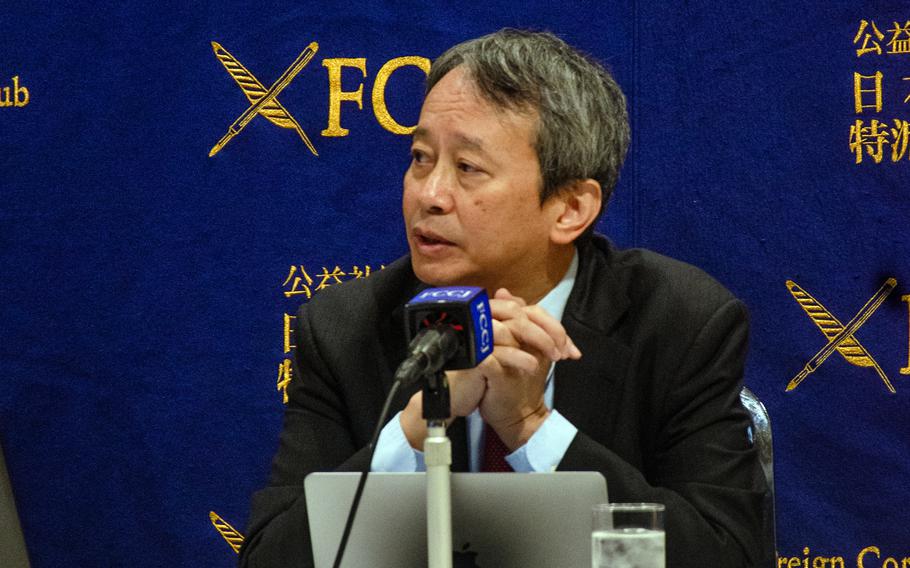
Koichiro Tanaka, a professor at Keio University and expert in international relations in the Middle East, speaks at the Foreign Correspondents’ Club of Japan in Tokyo on Nov. 2, 2023. (Jennessa Davey/Stars and Stripes)
TOKYO — The war in Gaza between Hamas and Israel threatens to drive oil prices higher, a concern for energy-dependent Japan, while complicating the island nation’s overall security situation, two experts said last week.
Japan relies on the Middle East for approximately 95% of its oil imports, according to Tom O’Sullivan, director of the Japan-based energy consultant firm Mathyos Global Advisory. The threat of the Gaza conflict drawing in larger players, such as Iran and the United States, means oil prices could rise significantly.
“About a third of the oil and gas consumed globally is produced in the Middle East, so any conflict there will have huge repercussions for the energy complex,” O’Sullivan said during a Nov. 2 seminar at the Foreign Correspondents’ Club of Japan in Tokyo.
If the U.S. is drawn into the conflict, it could weaken the U.S.-Japan posture in the Indo-Pacific, according to Koichiro Tanaka, a Keio University professor and expert in international relations in the Middle East.
“Regional conflict in the Middle East is a nightmare for Japan’s security,” he said at the seminar.
Japan has shown support for Israel in the conflict. Japanese Foreign Minister Yoko Kamikawa visited Tel Aviv on Friday, where she condemned terror tactics and called on Hamas to release the hostages it captured during its Oct. 7 attack, according to remarks by Secretary of State Antony Blinken at a press conference Wednesday in Tokyo.
Blinken spoke following a two-day meeting of the G7, the major industrial nations that include Japan and the U.S. He also noted a $75 million contribution by Japan to humanitarian assistance for civilians in Gaza.
“We had a very productive discussion with — the foreign minister and I — about important, vital issues like what needs to be done to minimize civilian casualties, to increase the flow even more of humanitarian assistance into Gaza, and to prevent the spread of the conflict to other places. And I think the United States and Japan are very clearly aligned on what needs to be done and what we’re working to do together,” Blinken said.
If the Gaza conflict widens, Japan’s primary concern will be evacuating citizens and protecting tankers coming from the Middle East, Tanaka said Nov. 2.
Japan began evacuating citizens from Israel immediately after Hamas’ Oct. 7 attack on Israel, he said. Protecting the country’s oil tankers, however, might be more complicated.
Japan has one destroyer and two patrol aircraft in Djibouti for counter-piracy operations, Tanaka said, that could be used to escort commercial shipping vessels.
However, Japan’s Legislation for Peace and Security, adopted by the country’s National Diet in 2015, doesn’t allow the Self-Defense Forces to protect civilian ships that sail under different flags.
“Under the maritime security order, Self-Defense Forces can only protect Japanese ships; we can’t protect foreign ships,” Tanaka said. “We can assume if there’s a wider conflict, perhaps there’ll be an international coalition to protect international shipping. But Japan has no legal foundation to join such an international coalition, and I think we have to address that.”
Japan could join a United Nations peacekeeping operation, Tanaka said. He speculated that the country would participate in such an operation provided a ceasefire between Hamas and Israel was in place.
Of more urgent concern for Tanaka was higher level involvement from the U.S. in the conflict. With the U.S. already supporting Ukrainian forces in Europe and Israeli forces in the Middle East, it might be stretched too thin to protect Japan in the event of a third conflict in Asia, he said.
“What if there’s another war in Asia? Can the United States handle this?” he said. “That’s a very big challenge and a very big concern for Japan.”
Another concern is an ongoing shortage of 155 mm shells, NATO-standard ammunition used in weapons across the world, including in U.S., Japanese, Korean and Israeli howitzers, Tanaka said.
“The United States is already over capacity for production, and this ammunition is also necessary in Asia if there’s a war,” he said. “So, the lack of ammunition could be a great concern if there’s a war engagement.”